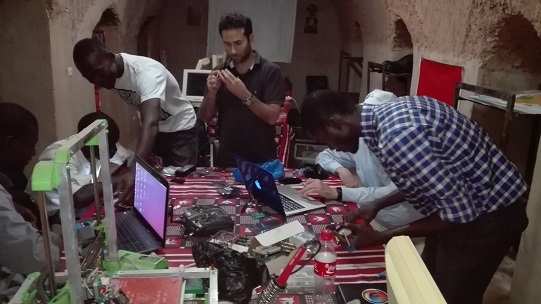-
About
- Our Work
- Get Involved
- Stay Updated

It is not only in Developed countries that the power of data is leveraged. In the context of climate change, the young Techies from Burkina Faso are shaping the future of irrigated agriculture.
Water management in a changing climate
The extreme weather events now recognized as "climate disruption" severely affect agricultural production in the world. We are now witnessing longer droughts but also in the opposite drastic floods across the globe. In West Africa, including Burkina Faso which is a Sahelian country, it is the droughts that are plaguing our rural communities. It is estimated that between 1 and 3 tonnes of water are needed for 1kg of rice production (source FAO). However, some sahelian countries are bellow the 1000m3 per capita threshold that defines water scarcity. Hence, water optimization in the region is one of the greatest challenge for the achievement of the SDGs. Between optimization and reuse of water for agriculture, it is necessary to measure.
Data as a key component of adaptation
At the day after the Paris agreement, it's obvious that the 2°C will make no sense without data and above all Open Data . As we are in the heart of the Data Revolution a man said and I quote: "If we have data, let's look at them. If the only things we have are opinions, let's go with mine."
When it comes to agricultural water management in developing countries, FAO has made immediate recommendations to help develop practical adaptation and mitigation strategies. these include:
- Ensure better prediction of the impacts on agricultural systems in closely specified regions and types of production system. This can be carried out using the typology and decision analysis outlined in this publication.
- Provide assistance in developing and applying downscaling techniques to better analyse agroclimatic futures and in the process, build local capacity in modelling and climate adaptation.
- Orchestrate targeted analysis of the investment needs for different solutions, which takes into account long-term embodied and operational energy use. These tasks are required for all agricultural impact and adaptation studies, and sit at a higher strategic level than work on irrigation and water use in agriculture.
For more details please read (FAO Water Reports 36).
Considering the above recommendations, we can see the central role that data can play. In fact, the collective knowledge building from the data collected on each individual farm will not only help shape development programs but also ensure the inclusion of farmers themselves in these programs. We are actors in this component of the battle, which aims to help build Climate Change Literacy among farmers toward smart adaptation and mitigation. Yes, Through Open Data initiatives, a small community of Geeks based in Ouagadougou is trying to make things happen.
The Internet of things (IoT) and the Ouagalab
OuagaLab is a community of young innovators based in Ouagadougou, Burkina Faso. Using technology wisely as development lever while putting at the center the local context is our leitmotiv. Our latest finding is the use of the Internet of things (IoT) for the sustainable management of water resources for more productive irrigated agriculture. eEAD (electronics for water and sustainable agriculture) is the name of that finding.
Indeed, with plugged sensors on a solar powered Arduino-like boards named Autonomo, we build the eEAD tool that measures the availability of well water, soil humidity but also conventional variables such as temperature and pressure. These data collected help optimize irrigation system but also prevent and anticipate the wells water shortages.
The drip irrigation systems are automatically operated on the basis of pre-defined thresholds. These different thresholds are adjusted along the learning process. The result is a better understanding of the returns of various speculations based on the volume of water used. All the data are made available to the farmer's cell phone to also serve as knowledge for adaptation.
The good news is that the OuagaLab rooted in its convictions of the free world (free as free software) is proud to share with anyone willing to learn. As a Maker, Ouagalab would be honored to see one of its members join young farmers from around the world to understand their needs, anything that inspires innovation in a world where change is the only constant.
I am Malick Lingani, a Social Entrepreneur from Burkina Faso. Co-Founder of the NGO BEOG-NEERE.Org and Mentor in the innovation hub OuagaLab, I've been selected for the UN CFS Y4FSN (Youth for Food Security and Nutrition) Idea Incubator with the Agrishare project to promote MOOCs for Youth in Agriculture. My educational background is Software Development and I'm certified Data Scientist by John Hopkins University.
Picture: Building and programming eEAD at the Ouagalab
This blog post is part of the GCARD3 Youth blogpost applications. The content, structure and grammar is at the discretion of the author only.
Tags:About the author
Related Posts
Comments
No comments made yet. Be the first to submit a commentBy accepting you will be accessing a service provided by a third-party external to https://www.ypard.net/
Get in touch
Email: [email protected]
YPARD Global Coordination UnitHosted by AGRIDEA and the Czech University of Life Sciences Prague
Lausanne, Switzerland and Prague, Czech Republic - Our Work

